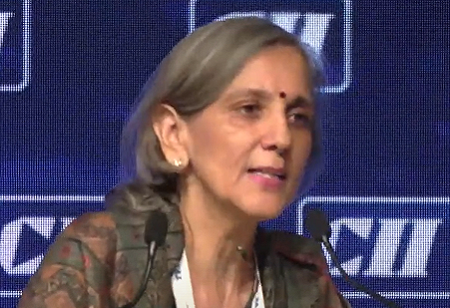
Dr. Rohini Somanathan, Professor, Delhi School of Economics, speaking at the global economic policy forum 2024, spoke about India’s unique yet precarious demographic advantage that would favour the nation in economic development only in the short term. She also suggested solutions to counteract the upcoming and inevitable paradigm shift gearing towards an aging population. Key insights from her talk are discussed below.
India is at a crucial juncture as one of the youngest nations globally, presenting a demographic advantage that, while temporary, holds immense potential. A key solution lies in reforming the educational system through public-private partnerships, especially in higher education. While Indian industrialists have significantly supported foreign universities, this level of engagement within India remains limited. Reducing regulatory constraints and fostering private investment in domestic education could bridge this gap.
Additionally, the low participation of women in the workforce just 27%, among the lowest in the world—is a significant challenge. It is advised to address structural barriers and societal norms by promoting localized employment opportunities, flexible work arrangements, and corporate engagement in creating supportive environments. Encouraging women's participation would not only enhance their economic independence but also contribute significantly to national productivity.
Looking ahead, India must prepare for the inevitable demographic shift toward an aging population, transitioning from the “demographic dividend” to what Japan refers to as the "silver demographic dividend." As life expectancy rises, there will be an increase in the dependency ratio, making it essential to explore ways to keep the elderly population productive. While recent government policies have expanded health insurance coverage, the focus must shift to preventive care, which is far more cost-effective than treatment-based systems. Collaboration between corporate entities and public health institutions, particularly in smaller towns and rural areas, can ensure comprehensive and sustainable healthcare solutions for an aging population.
Sustainability must go beyond large-scale initiatives to focus on empowering local communities. A reimagined approach to systems like the Public Distribution System (PDS) could enhance efficiency and foster self-reliance. Currently, the PDS involves large-scale transportation of grains and food products to villages across the country. By enabling families to procure food locally with government subsidies, the system could reduce transportation costs, improve food quality, and make accountability more tangible.
This local-first approach to sustainability does not imply isolation from technological advancements or economies of scale. Instead, it envisions a balanced system where local communities are more self-sufficient while benefiting from external resources. However, their success often depends on the support of corporate India. Corporations can assist with marketing, mechanization, and the integration of advanced technologies, creating a symbiotic relationship between rural and corporate ecosystems.
To address broader environmental and sustainability challenges such as climate change, Experts advocate for strengthening micro-level systems. It was argued that the solution to many macro-level issues lies in empowering local communities to manage resources effectively, adopt sustainable practices, and become resilient to external shocks. For example, promoting localized food production not only addresses immediate nutritional needs but also reduces carbon footprints associated with transportation.
India’s path to sustainability must blend local resilience with global innovation. Corporations and policymakers must collaboratively design strategies that integrate local needs with advanced technological solutions, ensuring scalability and sustainability.
With corporate social responsibility now formalized, Indian businesses are well-positioned to play a pivotal role in addressing critical challenges such as education reform, healthcare, and sustainability. Corporate leaders must channel their resources and innovate their capacities towards empowering local communities, creating a model of development that is inclusive, equitable, and sustainable.
By aligning corporate initiatives with public policies and grassroots efforts, India can lay the foundation for a future that is not only economically robust but also socially and environmentally resilient. This collective approach can ensure that India leverages its demographic advantage, prepares for its aging population, and fosters sustainability from the ground up.
We use cookies to ensure you get the best experience on our website. Read more...